Dentures Leesburg
Get a Partial or Denture to Reverse Tooth Loss

A gaping hole in your smile can be embarrassing and make you feel more self-conscious about smiling in front of your friends, family, and co-workers. But your appearance shouldn’t be your only concern. Even one missing tooth can make it harder for you to eat the foods you love, and it can disrupt the balance of your bite, causing your other teeth to wear down faster. And of course, your mouth won’t be able to function correctly if you end up losing all your teeth.
If you or a loved one is dealing with extensive tooth loss, don’t let it disrupt your quality of life; contact Downtown Family Dental of Leesburg right away. Dr. Pham can provide you with a partial or full denture that fits comfortably in your mouth and restores your smile along with your ability to speak and chew normally.
Why Choose Downtown Family Dental of Leesburg for Dentures & Partials?
- High-Quality Materials for Realistic Restorations
- Dedicated Dental Team Focused on Patient Comfort
- Customized Treatment Plans for Each Patient
Who Is a Good Candidate for Dentures?

Missing teeth can have serious consequences for your health and quality of life. The good news is that most people who have suffered moderate to severe tooth loss can get dentures to reclaim a complete and confident smile. When you visit us for your restorative consultation, we will examine your mouth and learn a bit about you before we recommend a treatment plan. Even if you are not currently a candidate for the type of denture you desire, you may become one after some preliminary procedures.
Effects of Missing Teeth

Gum disease, accidents, genetic factors, and past lifestyle decisions can all contribute to tooth loss. Regardless of why your smile is incomplete, your condition may present a number of challenges in your daily life. For example, you might find it difficult to eat a nutritious and delicious variety of foods. You may feel self-conscious about your appearance due to the gaps in your smile or the loss of fullness in your cheeks. You might even find it difficult to speak clearly and with confidence. Fortunately, dentures have the potential to greatly enhance your daily quality of life.
What Qualifies You for Dentures?

Dentures may be right for you if:
- You have lost all or most of your teeth throughout a dental arch. If you have only lost one or two teeth, a different form of tooth replacement may be a better option.
- Your jawbone and gums are healthy enough to support dentures. You should be free of active gum disease and have adequate bone structure to support your prosthetic.
- You are looking for a cost-effective way to replace your lost teeth. Dentures tend to be more affordable than other forms of tooth replacement.
Alternative Tooth Replacement Options
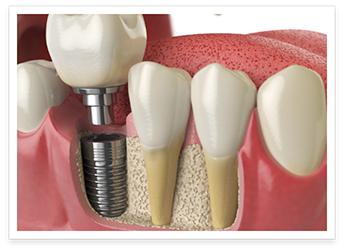
If dentures are not quite right for you, you may qualify for one of the following tooth replacement options instead:
- A fixed bridge. This type of restoration is attached to the remaining natural teeth and uses pontics (artificial teeth) to “bridge” an empty space. Fixed bridges are very strong and can last for 10 years or longer if they receive proper care.
- Dental implants. Dental implants are prosthetic tooth roots. They can bond with the jawbone and provide an incredibly strong base of support for crowns, bridges, and dentures. Due to their many benefits, they are frequently regarded as the best form of tooth replacement.
Partial Dentures
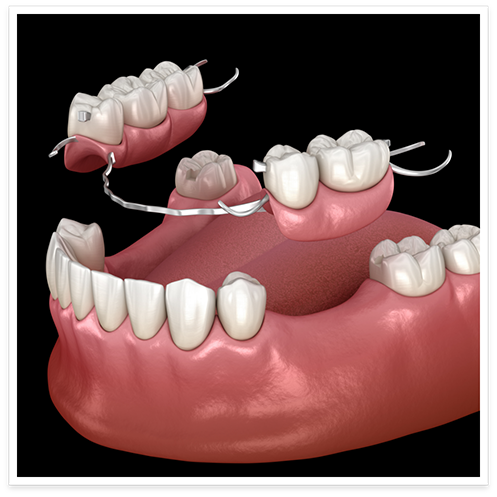
Some patients only have a few teeth missing, or they still have healthy teeth that they want to preserve. In these cases, partial dentures are normally used. There are two types of partials you can get: removable or fixed.
With removable partial dentures, the false teeth are attached to a metal frame that’s held in place with metal clasps. The advantage of a removable partial is that it can replace missing teeth in multiple areas at once. Each partial is designed with the help of an impression of your natural teeth, ensuring that it fits correctly and doesn’t stand out in your mouth. As the name implies, you can take your removable partials out at any time for cleaning.
Fixed partials are more commonly known as fixed bridges. Two crowns hold a false tooth or teeth between them and are attached to the teeth on either side of the gap. In some cases, we might not be able to use the surrounding teeth for support, or we may see an opportunity to preserve the natural tooth structure; in either case, the bridge can be supported by dental implants.
Full Dentures
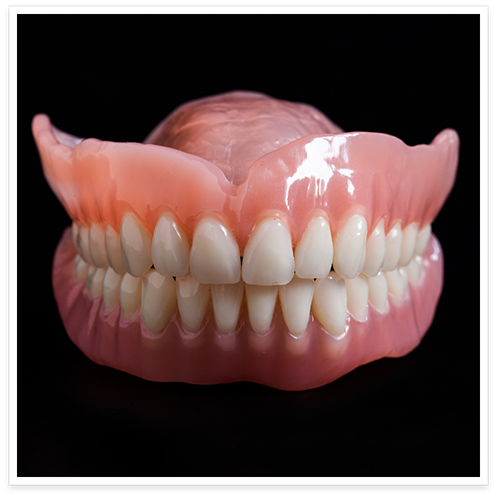
In the case that you’ve lost most of the teeth in the upper or lower jaw, you’re likely to need a full denture – an entire arch of false teeth attached to a gum-colored base. A full denture for the lower jaw will be shaped to avoid covering your tongue; if it’s for the upper jaw, we’ll need to decide whether it should cover the roof of your mouth.
Full dentures are carefully designed so that they won’t slip out of place while you’re chewing or speaking. When dentures are properly fitted, natural suction is enough to hold them in place, although you can use an adhesive for added security. You can normally expect your dentures to last for about 10 years or longer, although you’ll probably need several periodic adjustments before then.
Compared to other kinds of tooth replacement, partial dentures and full dentures tend to be less costly; however, this largely depends on the extent of said tooth loss. Talk to Dr. Pham about your oral health needs as well as ways to ensure that your restoration is affordable. Don’t forget to check your dental insurance to see what kind of benefits are offered when it comes to tooth replacement!
The Benefits of Dentures

Unfortunately, missing multiple teeth can make daily tasks, such as eating, speaking clearly, and smiling authentically, much more challenging. Thankfully, Dr. Pham can provide a lifelike set of dentures to replace those that were lost, regardless of how many natural teeth you have left.
Although this is the tried-and-true solution for tooth loss, it remains a popular treatment today due to its many advantages. Continue reading to learn more about the various benefits of choosing dentures to enhance your mouth’s appearance and functionality!
Psychological Benefits

One of the first things others notice about you is the quality of your smile, and you might develop anxiety or avoid spending time with people if you’re overly afraid of being judged for missing teeth.
Wearing dentures can help you overcome some of the changes to your looks, speech patterns, and dietary habits so often caused by tooth loss. You’ll enjoy some much-needed peace of mind once you’re able to eat, speak, and smile more confidently.
Clearer Enunciation

Gaps in your grin can also make it seemingly impossible to enunciate certain words, and many patients quickly grow frustrated when they feel like they can’t communicate clearly. For example, you might develop a slur or lisp, especially when trying to pronounce sounds like “s”, “th” or “v”.
Fortunately, dentures complete your arches, allowing you to relearn how to position your tongue against their surfaces to help overcome any altered speech patterns. It might take about a month for your mouth to acclimate to your restoration, though you can accelerate the process by practicing reading out loud to yourself and rehearsing challenging words until you feel more confident.
Improves Nutrition

Eating a variety of wholesome foods provides your body with the ingredients it needs to function at its peak, helping to maintain your oral and overall health. However, many healthier options, like raw fruits and vegetables or lean cuts of meat, can be difficult to bite and chew sufficiently to be swallowed and digested. This can contribute to gastrointestinal concerns or, in extreme cases, malnutrition.
Your new teeth restore a portion of your original bite force, allowing you to enjoy more balanced meals.
Preserves Oral Health

Any remaining natural teeth in your mouth are prone to shifting out of alignment to fill in the empty spaces left by the ones that went missing. This can wear down your enamel unevenly, increasing your vulnerability to cavities or injuries, as well as eventually cause a bite misalignment or TMJ disorder.
Wearing dentures helps ensure they remain in their rightful places to protect your dental health.
Expands Opportunities

Did you know that studies have shown that dental problems can negatively affect the likelihood of employment? People assume a lot about you based on the condition of your grin, and they might think you don’t know how to care for yourself or do not put in the effort if you have missing teeth.
Dentures are carefully customized to look and feel as lifelike as possible to boost your confidence. This allows you to put your best foot forward, which can, in turn, contribute to better professional achievements, a more engaging social life, and deeper relationships.
How Dentures Are Made

Dentures are customized to fit each patient, so this involves a multi-step process. After all, every smile is unique, so it’s important to take the time to make sure your replacement teeth perfectly suit you. Continue reading to learn more about what dentures are made from as well as how they are custom crafted just for you.
What Are Dentures Made Of?

Dentures are comprised of two different parts – the base and the replacement teeth. Here is what each of these parts consists of:
- Base: The base of the denture is the structure that supports the replacement teeth. It can be made from a range of different materials. They include acrylic, nylon, and resin. Most of the time, acrylic is used because it can be easily tailored to match natural gum tissue. Partial dentures often use metal clips with an acrylic base.
- Teeth: The replacement teeth are secured to the denture base. They are usually made from resin or porcelain because they both have a natural appearance. However, porcelain tends to be more popular because it looks and feels just like natural tooth enamel. It is also highly durable, so it is much less likely to become damaged.
The Denture Creation Process

Here is the step-by-step process in which your dentures are made.
- Your dentist starts by taking measurements of your jaw and impressions of your mouth. This will be used to create a model that is the exact size and shape of your mouth. The model is then used to make sure your final dentures fit as they should.
- The model is sent to the dental laboratory. This is where your dentures will be made. They will start by creating a wax replica of your gumline.
- The replacement teeth will be set in place using a mechanical device called an “articulator.” Adjustments are then made by a technician.
- Your wax dentures are sent to the dental office for a fitting. If they look good, your dentist will return them to the dental lab.
- Once back at the lab, the lab technician will place your dentures in a flask. Plaster is poured in to maintain their shape. The entire flask is placed in hot water to melt the wax. Holes are made in the teeth and acrylic is injected into the flask to replace the wax.
- The plaster is then carefully removed from the denture with special tools. The dentures are placed in an ultrasonic bath to clean the rest of the plaster off.
- Any excess acrylic is cut from the dentures. Then, it is polished to perfection.
- Now that your dentures are complete, they will be sent to your dentist. Then, you will return to the office for a fitting. If everything looks and feels as it should, you can leave the practice with your new and improved smile!
Adjusting to Your New Dentures

It is common for patients to experience some soreness when they first get their new dentures but don’t worry. This is normal and temporary. With some time, your mouth will adjust to your new prosthesis, and your dentures will begin to feel just like your natural teeth. Just remember to stick to softer foods and exercise your facial muscles. If discomfort persists or you have any concerns about your replacement teeth, don’t hesitate to reach out so we can help.
Understanding the Cost of Dentures
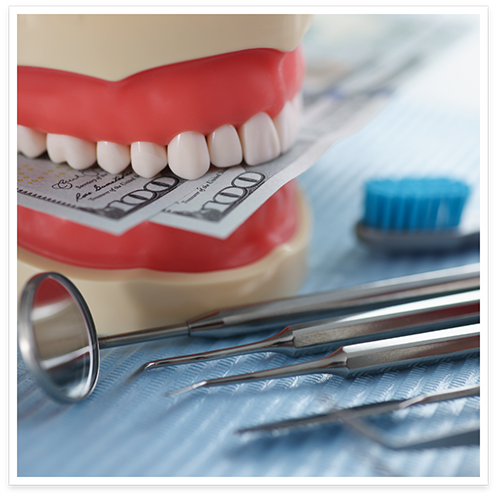
The cost of dentures will vary for each patient, as every case is entirely different. There are many different factors that contribute to the price. During your initial consultation with us, we can determine exactly how much you can expect your new restoration to cost. In the meantime, here are some things for you to keep in mind.
Factors that Affect the Cost of Dentures

Here are the major factors that will determine the cost of your new dentures:
- The preparation before you get your dentures will contribute to the overall cost. This includes preliminary treatments, like gum disease therapy and tooth extractions, when needed.
- The materials used for the base and replacement teeth. The base is typically made from acrylic while replacement teeth can be crafted with acrylic or porcelain.
- The number of teeth you are having replaced will contribute to the price. The more teeth, the more the restoration will cost.
Remember that a cheaper denture doesn’t necessarily mean a better denture. If you end up opting for a budget restoration, it will be more likely to require repairs and replacements in a shorter period of time. When you invest more in your restoration, you will see the difference in quality.
Are Implant Dentures More Expensive?
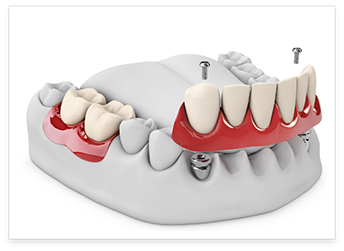
Implant dentures cost more than traditional dentures, but there is a good reason for this. Instead of being supported by the shape and suction of the gums, they are held into place by a series of dental implants that are placed in the jawbone via a surgical procedure. This allows for additional benefits, like being more lifelike, having additional stability, and lasting for several decades.
Does Dental Insurance Cover Dentures?

Patients can usually expect some level of coverage with most dental insurance plans. Many provide up to 50% coverage, but this varies depending on the plan that you have. At Downtown Family Dental of Leesburg, we are in-network with Blue Cross/Blue Shield, Delta Dental, and MetLife, but we also welcome out-of-network providers. If you have any questions or need help, talk to one of our friendly team members. Or to learn exactly how much you can expect your dentures to cost, schedule a consultation with us. We’re eager to help you get your smile back!
Denture FAQs
Should I Have All My Teeth Pulled to Get Dentures?
Repairing a damaged tooth whenever possible is always preferable to replacing it. Tooth extractions of any kind will only ever be recommended if deemed absolutely necessary, like when a tooth is too damaged to save thanks to extensive decay, severe infection, or trauma. If all of the teeth in an arch are either decayed or infected with gum disease, replacing them with dentures may be a viable option, but your dentist will always explore all of your options before recommending extractions for dentures.
Can I Sleep with My Dentures?
Dentists generally recommend taking your dentures out at night when you go to bed. When you first get your dentures, you’ll typically be told to keep them in your mouth for 24 hours, including when you sleep, but after this, you should be taking them out every evening. This is because wearing dentures restricts the circulation in your gums, leading to soft-tissue irritation and potentially speeding up ridge resorption. Taking dentures out at night gives the gums a chance to recover and get the nutrients they need.
Will It Hurt to Get Dentures?
If you need to have teeth extracted before you can get dentures, you’re likely to experience some discomfort after oral surgery, but this can be managed with recommended over-the-counter and prescribed pain medication. The discomfort should improve 3 to 5 days after your procedure. When you first receive new dentures, some minor irritation may occur while your mouth adjusts to the new appliance. The amount of time that the discomfort lasts will vary from person to person. If this persists, give us a call so we can take a look.
Will Dentures Change the Shape of My Face?
When you lose your teeth, your facial muscles will start to sag, and this can give your face a sunken appearance. Getting dentures will mean providing support to facial muscles that have collapsed. Ill-fitting dentures may not give your facial muscles the proper support they need, so it’s important that your restoration fits perfectly in your mouth. If your denture doesn’t fit properly, you should have it refitted or replaced as soon as possible.
Should I Have All My Teeth Pulled to Get Dentures?
Repairing a damaged tooth whenever possible is always preferable to replacing it. Tooth extractions of any kind will only ever be recommended if deemed absolutely necessary, like when a tooth is too damaged to save due to extensive decay, severe infection, or trauma. If all of the teeth in an arch are either decayed or infected with gum disease, replacing them with dentures may be a viable option, but your dentist will always explore all of your options before recommending extractions for dentures.
Can I Sleep with My Dentures?
Dentists generally recommend taking your dentures out at night when you go to bed. When you first get your dentures, you’ll typically be told to keep them in your mouth for 24 hours, including when you sleep, but after this, you should be taking them out every evening. This is because wearing dentures restricts the circulation in your gums, leading to soft-tissue irritation and potentially speeding up ridge resorption. Taking dentures out at night gives the gums a chance to recover and get the nutrients they need.
Will It Hurt to Get Dentures?
If you need to have teeth extracted before you can get dentures, you’re likely to experience some discomfort after oral surgery, but this can be managed with recommended over-the-counter and prescribed pain medication. The discomfort should improve 3 to 5 days after your procedure. When you first receive new dentures, some minor irritation may occur while your mouth adjusts to the new appliance. The amount of time that the discomfort lasts will vary from person to person. If this persists, give us a call so we can take a look.
Will Dentures Change the Shape of My Face?
When you lose your teeth, your facial muscles will start to sag, and this can give your face a sunken appearance. Getting dentures will mean providing support to facial muscles that have collapsed. Ill-fitting dentures may not give your facial muscles the proper support they need, so it’s important that your restoration fits perfectly in your mouth. If your denture doesn’t fit properly, you should have it refitted or replaced as soon as possible.
I Need a Checkup & Cleaning I am Worried About Gum Disease I Need a Dentist for My Child I Have a Cavity or Broken Tooth I am Missing One or More Teeth I Want to Enhance My Smile I Want a Straighter Smile I am Scared of the Dentist I Have a Dental Emergency I Have Sleep Apnea or Snore I Have Jaw Pain & Headaches View Our Services




